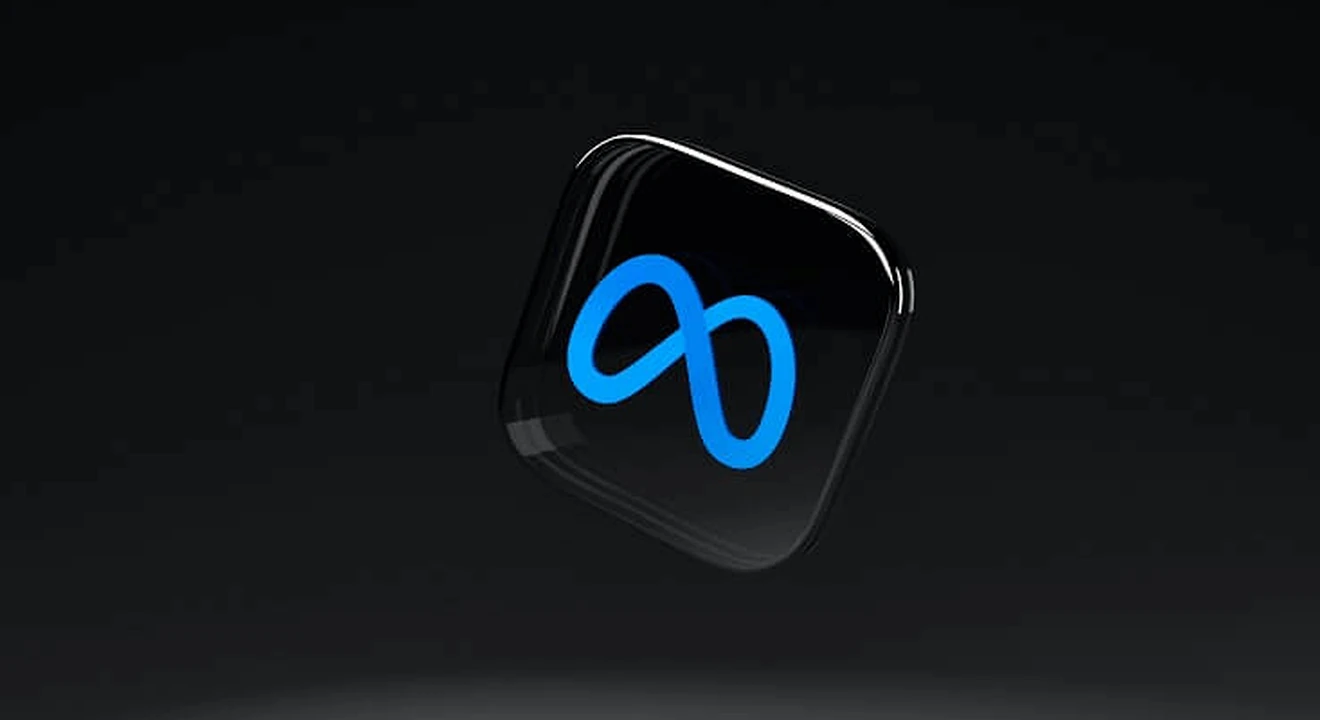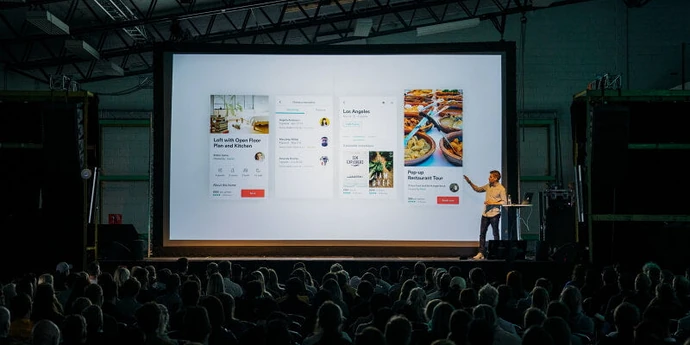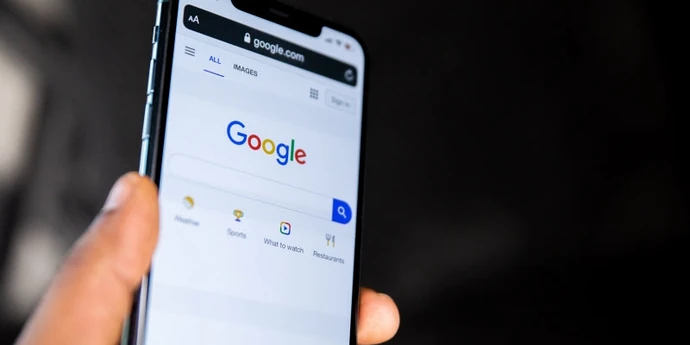Meta’s interview process is time-consuming and difficult, and not knowing what’s ahead makes it even harder to prepare for.
We’re here to help. We work with 100+ ex-Meta interviewers on our platform, who have helped thousands of candidates navigate the Meta interview process.
Here’s what you need to know: Meta’s interview process can take from 4 weeks up to 5 months, and there are 7 steps: resume screen, recruiter call, screening(s), full loop interviews, interviewer debrief, hiring committee, and salary negotiation. The steps that will require the most preparation are the screening and the full loop.
In the rest of this article, we’ll dive deep into each step of the recruitment process and how you can prepare for it.
- Step 1: Resume screen
- Step 2: Recruiter call
- Step 3: Screening interview(s)
- Step 4: Interview loop
- Step 5: Debrief
- Step 6: Candidate review/hiring committee
- Step 7: Salary negotiation
Click here to practice 1-on-1 with ex-Meta interviewers
But before we get into each step, let's get to know Meta first.
About Meta
Formerly known as Facebook, Meta was founded in 2004 as a social networking company. It has since grown to include other apps, including Messenger, Instagram, WhatsApp, Workplace, and others. It is also delving into augmented, virtual, and mixed reality.
Meta is currently valued at $1.63 trillion as a public company. It employs around 75,900 people worldwide, with office locations in every part of the world. At the end of Q2 2025, Meta announced that it has 3.48 billion daily active users across its products.
As expected from one of the world’s top tech companies, Meta is incredibly hard to get into. But, don’t let that intimidate you. According to ex-Meta PM Danielle, “In general, Meta has a very structured (interview) process and is looking for a specific signal; they try to make the evaluation as objective as possible.”
Here's a quick snapshot of Meta as a platform:
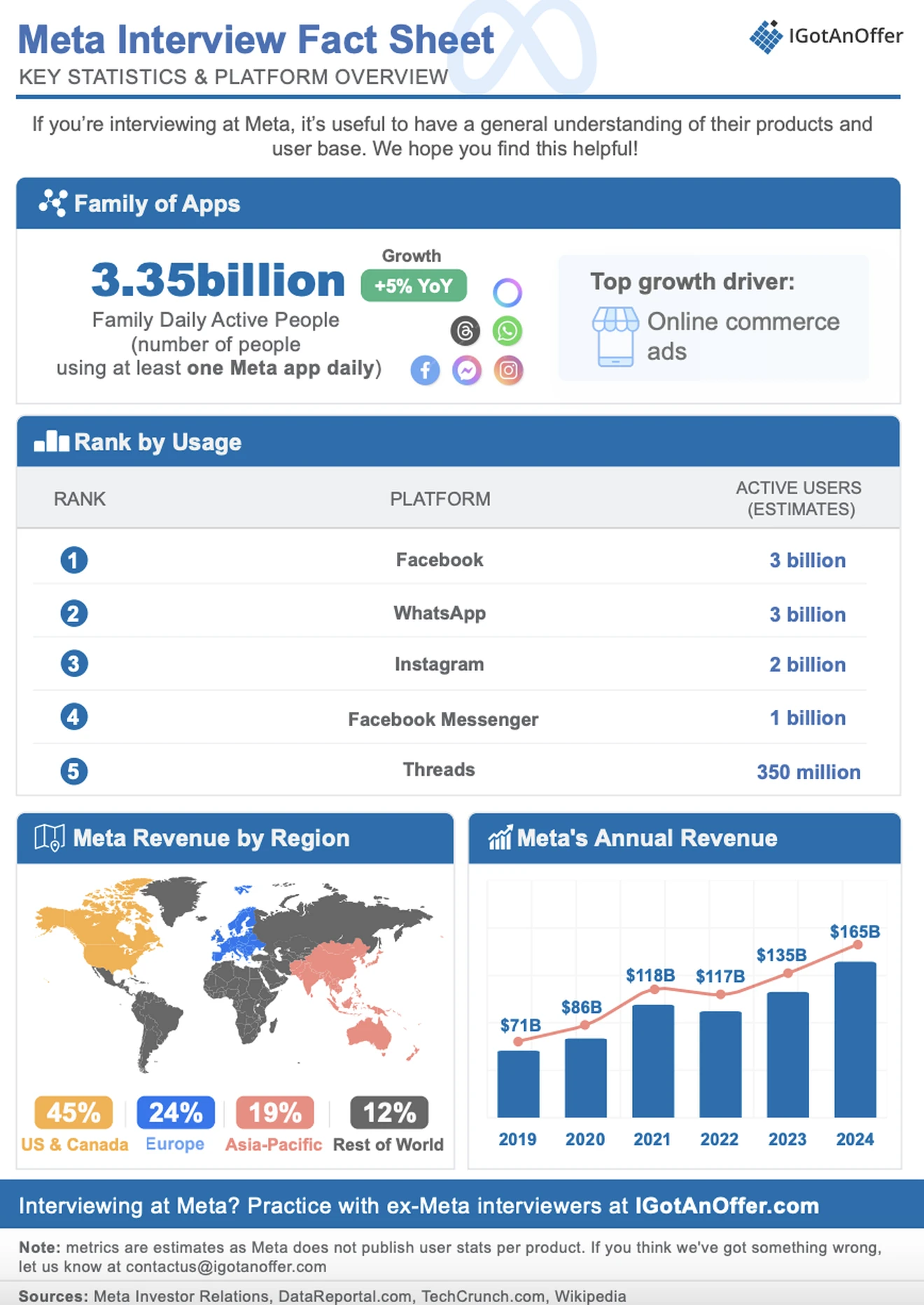
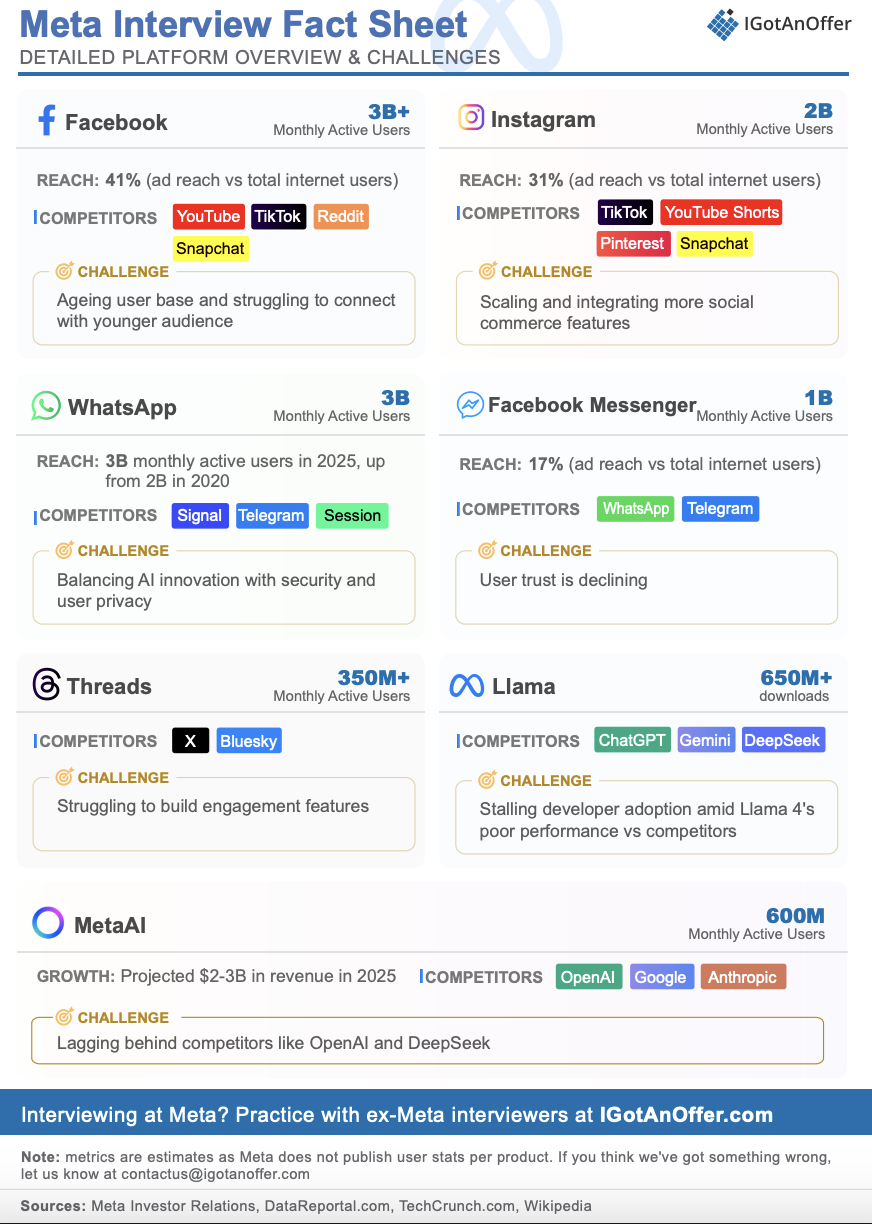
Click here to download the Meta interview fact sheets
Working at Meta
Here are a few things about working at Meta that make it unique from other top tech companies, according to some of our current and ex-Meta coaches.
Very fast-moving
“Things change really fast at Meta and hence engineers should be able to adjust to changing circumstances and priorities very quickly.” Pranav, ex-Meta engineering manager.
One of Meta’s top core values is “Move fast”. Hence, if you’re applying for any role at the company, you’ll have to be comfortable acting with urgency and oftentimes learning as you go.
Bottom-up culture
“There is an expectation that you will have a strong level of autonomy, ownership, and dealing with ambiguity.” Tom, ex-Meta data engineering manager.
Unlike companies like Amazon, Meta works with a bottom-up culture which gives managers autonomy to drive decisions and actions.
As a Meta employee, you’ll also be given the autonomy to choose how you want to make an impact. You’ll be expected to influence a great deal what you want to work on and how you want to hold yourself accountable.
Encourages experimentation
Meta lives up to three of its core values “Focus on long-term impact”, “Build awesome things”, and “Live in the future” by encouraging a strong culture of experimentation.
To boost this culture of constantly testing, optimizing, and iterating, Meta has developed what ex-Meta PM turned coach Mark R describes as an “unparalleled experimentation platform” and library which have been deployed at scale at Meta. Both tools are now being used as part of what the company calls ‘adaptive experimentation’ which Meta performs to tackle a broad range of problems, including product and infrastructure optimization, among other things.
Great salaries
Of course, the excellent salaries on offer are likely to be part of your reason for applying to work at Meta. Software engineers, in particular, generally get a higher base salary and compensation than the software engineers of other big tech companies, with their expected pay 57% higher than the average salary of peers in the US.
If all these sound exciting to you, then you’re definitely applying to the right company.
Now, let’s get into the actual Meta recruitment process.
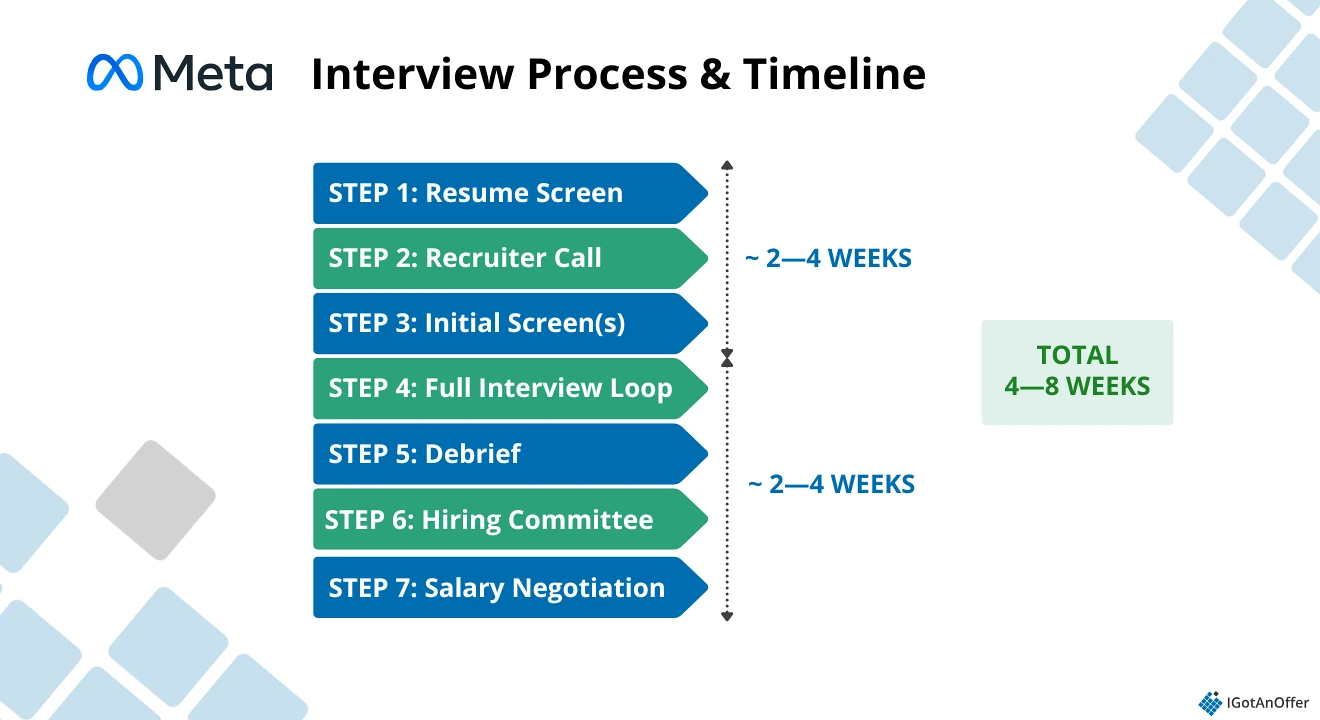
Step 1: Resume screen↑
The first step of Meta’s interview process is the resume screen. Here, after you’ve submitted your application through the Meta jobs portal, or been contacted directly via email or LinkedIn, recruiters will evaluate your resume to see if your experience aligns with the open position.
This is an extremely competitive step, as we’ve found that ~90% of candidates don’t make it past the resume stage. To help you put together a targeted resume that stands out from the crowd, follow the tips below:
Tips on crafting a resume:
- Study the job description: The work experience that you showcase on your resume should relate directly to the role qualifications that you’re applying to.
- Be specific: Use data to back up your claims. How many people were on the team that you managed? How were your successes measured? Quantify as much as you can.
- Emphasize leadership: Meta values emergent leadership. As much as you can, highlight roles and positions where you took the lead and managed others, if applicable.
- Be concise: Recruiters often don’t have the time to study a resume in-depth, so make sure to keep your resume clear and concise, emphasizing roles and achievements that make you stand out.
The tips above include abbreviated information from our tech resume guides. For more detailed steps as well as examples from successful Meta candidates, take a look at one of our resume guides below:
- Meta resume guide
- Tech resume guide
- Software engineer resume guide
- Product manager resume guide
- Technical program manage resume guide
- Engineering manager resume guide
- Data science resume guide
- Machine learning engineer resume guide
The guides above are great starting points for you to make a competitive resume for free. However, if you want personalized feedback and tips from those who know Meta’s hiring process firsthand, you can get input from Meta resume coaches themselves.
At any point during your application to Meta, you can sign up for a Career Profile on Metacareers. This portal is the company’s one-stop shop for all things related to your application. There, you can track your application progress, send thank-you notes to your interviewers, and update your information in real-time. It also contains quite a lot of useful interview prep resources relevant to the role you’re applying for.
Step 2: Recruiter call↑
If your resume passes through the resume screen, a Meta recruiter will reach out to you to schedule a call. This generally lasts 20–30 minutes.
In most cases, this call is not technical, although candidates for some highly technical roles, like software engineering, may receive a few low-level screening questions that test general technical knowledge.
Otherwise, you should expect questions like, “Tell me about yourself,” “Why Meta?”, and “Walk me through your resume.” Be prepared to go over your previous experience and explain your motivation for applying to the company.
The recruiter will also discuss with you how the overall interview process will work. If you have any specific questions (e.g. timeline, location, clarification about the job description), now is the time to ask.
Your recruiter should also provide you with helpful interview prep materials from Meta. If you haven’t yet signed up for the Career Profile portal, your recruiter will give you a link to sign up for one.
Some roles (such as SWE and MLE) may also get an online assessment as part of or before their recruiter screen, as reported by a few candidates on Glassdoor. According to this Reddit post, it’s a 90-minute proctored round, requiring you to keep your video and mic on. You’ll get a base problem with 4 stages, and you’ll need to pass each stage to proceed to the next.
If all goes well, the recruiter will get back in touch with you to schedule your first interviews: the initial screens.
Step 3: Screening interview(s)↑
Depending on the role, you will have one or two screening interviews with a hiring manager and/or future peers. In most cases, these will be video calls, although some interviewers may opt for audio-only mode. There are also cases where you might be invited for in-person interviews.
At this point, interviewers will dig deeper into your past experience with behavioral and hypothetical questions that test specific skills related to the role.
Technical roles will also include coding on a shared code editor, Word document, or a whiteboard if it’s in person. In most cases, it will not include syntax highlight or auto-completion, so prepare for that kind of coding environment in advance.
We’ve researched the interview process and questions for nine Meta roles, so we’ll give you a rough idea of what to expect for different types of interviews below.
What to expect in Meta initial screens (by role):
- Product managers: you’ll have two 45-minute interviews that focus on product sense and analytical thinking.
- Software engineers: you’ll have a 45-minute tech screen with an engineer where you’ll be coding on a simple coding editor (e.g. Coderpad.io) and answer data structure and algorithm questions.
- Engineering managers: you’ll have a 45-minute session with an EM where you’ll be discussing your people management and cross-collaboration experience, your technical design and architecture knowledge, and your career goals and motivations as a leader.
- Data scientists: you’ll be asked a few general background questions, as well as SQL, coding, and statistics questions. You’ll be showing your answers on a shared coding platform (e.g. Coderpad.io).
- Data engineers: you’ll have a 60-minute tech screen divided into two sections: SQL and coding with Python. For each, you may answer up to five questions depending on your speed.
- Machine learning engineers: you’ll have a 45-minute tech screen with an engineer where you’ll be coding on a simple coding editor (e.g. Coderpad.io) and answer data structure, algorithm, recursions, and binary trees.
- Technical program managers: you’ll have a 45-minute interview with a product TPM in which you’ll be assessed on your program management, cross-functional leadership, and technical abilities.
- Account managers: you’ll have one interview where you’ll be asked behavioral and background questions that test your client service skills. In some cases, you may have to prepare a case study.
- Product designers: you’ll have a 45-minute interview where you’ll be asked to talk through at least two product design case studies or recent work samples.
You can refer to our Meta phone screen interview guide to learn more about this stage of the process.
Ultimately, if you’re prepared for the types of in-depth questions you’ll receive at the interview loop stage, then you’ll be prepared for the initial screens.
TIP: For engineer candidates, if your initial technical screen is still at least 10 days away, you can request a 1:1 mock interview with a Meta engineer through your Career Profile.
Once you clear the initial screens, it’s time to get ready for the interview loop.
Click here to find out if you're ready for your FAANG interview.
Step 4: Full loop interviews↑
The longest and most daunting step of the Meta interview process is the full loop. This may take place in their physical offices or via video call.
Here, you will have three to six interview rounds that last 45-60 minutes each. Your recruiter should let you know what to expect for each round, but essentially, you can expect a more in-depth version of your initial screen, some more behavioral questions, and more role-related knowledge questions.
TIP: If you’ve received a schedule for your full loop interviews, you can request to chat with an employee and learn what it's like to work at Meta through the Meta Connections Program.
As we mentioned before, we have created in-depth guides to the interviews for top Meta roles. We also have skill-specific guides for certain roles. In each guide, you’ll find a breakdown of the interview loop or interview category specific to the roles you’re applying for, plus some example questions we’ve gathered from real candidate reports on Glassdoor.
Role-specific
- Meta Software Engineer interview guide, plus these level-specific Meta engineer interview guides:
- Meta Engineering Manager interview guide
- Meta Product Manager interview guide
- Meta Product Marketing Manager interview guide
- Meta Rotational Product Manager interview guide
- Meta Data Engineer interview guide
- Meta Data Scientist interview guide
- Meta Research Scientist interview guide
- Meta Machine Learning Engineer interview guide
- Meta Production Engineer interview guide
- Meta Front-end Engineer interview guide
- Meta Technical Program Manager interview guide
- Meta Program Manager interview guide
- Meta Account Manager interview guide
- Meta Product Designer interview guide
- Meta Research Engineer interview guide
Skills-specific
- Meta Coding interview guide
- Meta Project Retrospective interview
- Top 5 Meta Interview Questions (with Answers) guide
Meta interview experiences
Based on Glassdoor interview reviews, 57% of candidates consider their Meta interviews as a positive experience, slightly worse than Amazon, Apple, and Google interviews, but better than Netflix and OpenAI interviews.
Those who rated the interview process positively or neutrally described it as smooth, structured, and straightforward, with helpful and organized interviewers who made the entire process generally pleasant.
Those who rated the experience poorly noted how unnecessarily long the interview process was. Some report having to wait weeks in between interviews, getting minimal updates from recruiters, and being made to repeat interviews because the interviewers were unsure about them.
As for the level of difficulty, many describe Meta interview questions as challenging but good or rewarding. A few candidates who did not succeed with the technical interviews noted their failure was due to a lack of rigorous preparation, and those who did get an offer reported practicing for months. Many who did not get an offer said that they would like to try again because the interview process was generally a good learning experience.
Check out our article on what a real Meta interview experience is like, featuring stories from 7 real successful candidates that we've worked with.
Step 5: Debrief↑
After you finish your interview loop round, your interviewers will come together to compare notes on your performance in what is called the Debrief.
Each interviewer will have written a summary of their experience with you, including the questions you were asked and your answers, as well as a final recommendation (e.g., Strong hire, hire, leaning hire, strong no hire, no hire, leaning no hire, etc.).
There are three possible outcomes from this meeting:
- Your profile is passed on to the hiring committee. (Typically, if you have majority “hire” recommendations.)
- You are called back in for follow-up interviews, to get more information. (Typically, if you get mixed reviews on one or two specific competencies.)
- Your profile is not passed on to the hiring committee, and you do not receive an offer. (Typically, if you get multiple “no hire” recommendations.)
Note that your profile being passed on to the hiring committee does NOT guarantee you'll be getting an offer. It is, however, a step in the right direction.
After your interview loop, you can expect your recruiter to give you a timeline and the next steps as they become available. Now, all you have to do is relax and wait. You can ask for an update if you haven’t heard back from your recruiter a week after your last interview round.
Step 6: Candidate review / Hiring committee↑
Finally, a hiring committee made up of third-party Meta employees will convene to review the information passed on to them from the debrief. This may also be called the “candidate review.”
This committee will review the information packet from the debrief committee as well as the input from your initial screening rounds and application. As this group will not have met you in person during any of your interviews, they aim to review your profile without any bias.
The hiring committee makes the final decision on whether or not you will receive an offer. Prior to 2023, candidates at Meta commonly went through team matching at a 6- to 8-week program for new hires called the Bootcamp.
Now, sources suggest team matching no longer happens during Bootcamp period (though Bootcamp training is still a thing), and that you won’t get an offer until you get matched with a team. You can read more about how team matching works in our Meta team match guide.
Right now, it’s hard to verify whether this is true in all hiring cases. Either way, your recruiter will keep you updated on the hiring committee’s final decision.
The wait time varies, but if you have not gotten an update within a week or two of your interview loop, you can politely check in with your recruiter to get an idea of where you are in the process.
If you've already interviewed at Meta and received a rejection, don't worry. You can always bounce back and try again. Learn more tips on how to move forward with our Meta interview rejection guide.
Step 7: Salary negotiation↑
Finally, once you’ve passed each of the six steps above, you’ll receive your offer package from Meta.
At this point, all that is left for you to do is negotiate your offer. Your recruiter will get in touch with you about the details, likely scheduling one final call to clarify and discuss the terms. If they have not scheduled a call, you can ask for one.
Of course, salary discussions can be difficult and a bit uncomfortable, especially if you are not used to them. Below are some tips to help you navigate your salary negotiations.
Salary negotiation tips:
- Be polite: Remember that the person you’re negotiating with is just doing their job, and that the two of you are not enemies. You’ll get much further in your negotiations if you approach the conversation with grace.
- Don’t give a number right away: Whenever possible, it’s better to wait until you receive an offer to start negotiating. This reduces the risk of giving a number that is lower than what the company otherwise would have paid, or giving a number that is so high that they'll be reluctant to interview you.
- Do your research: Have a number in mind before the conversation begins, and back it up with data. Research your position and level on Levels.fyi, ask around on professional social networking sites like Blind, factor in the cost of living where you are, and, ideally, get some input from a current Meta employee.
- Start high: To start the conversation, name a compensation number that is higher than your goal, and the Meta negotiator will likely end up negotiating it down to a number that is closer to your original goal.
- Negotiate everything: Your offer will include more than a base salary and stock options—you also have bonuses, vacation days, location, work from home, and other aspects to consider. If the salary won’t budge, there may be some wiggle room around the other perks.
For even more salary negotiation tips, check out our Meta job offer negotiation guide. Once you’re ready to put your negotiation skills to the test, get salary negotiation coaching from ex-FAANG recruiters so you can practice with and get instant feedback from a real expert.
Once you’ve completed this step and accepted your offer, congratulations! It’s time to start your career at Meta.
Are you prepared for your Meta interviews?↑
We've coached more than 20,000 people for interviews since 2018. In our experience, practicing real interviews with experts who can give you company-specific feedback makes a huge difference.
Find a Meta interview coach so you can:
- Test yourself under real interview conditions
- Get accurate feedback from a real expert
- Build your confidence
- Get company-specific insights
- Learn how to tell the right stories, better.
- Save time by focusing your preparation
Landing a job at a big tech company often results in a $50,000 per year or more increase in total compensation. In our experience, three or four coaching sessions worth ~$500 make a significant difference in your ability to land the job. That’s an ROI of 100x!
Frequently asked questions about the Meta interview process↑
#How many rounds of interviews are there in Meta?
Depending on the role you’re applying for, you may face up to 9 rounds of interviews, including 1 recruiter call, 1 to 2 initial screens, and 3 to 6 interview loops.
#How long is the Meta hiring process?
Based on recent Glassdoor reports, the Meta hiring process can last for 4 weeks up to 5 months. Some candidates report waiting up to 2 weeks before hearing back from the recruiter in between interviews. Official Meta guides can’t give an estimate, but they advise reaching out to your recruiter if you haven’t heard back within a week after each step.
The longest you’ll have to wait is after your full interview loop. Prepare to wait at least 5 weeks for the result. You can check your Career Profile for any movements, but if there aren’t any updates in there, you can check in with your recruiter. After the result, you may also have to wait a few more days or weeks for team matching, depending on whether there’s a backlog for the role you’ve applied to.
#How difficult is the Meta interview?
Meta interviews are difficult, as you might expect from one of the world’s biggest companies. However, it also has a structured approach to the interview process, so you generally know what to expect at each step of the way.
Meta also provides tons of candidate assistance online, including detailed prep guides, and opportunities to request mock interviews (for engineers) and interact with a Meta employee.






